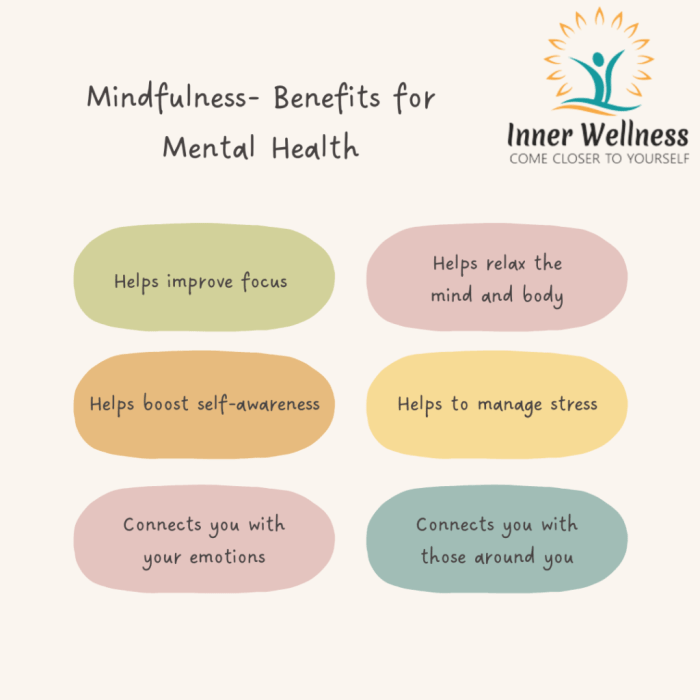Kicking off with Mental Wellness Tips, this guide is your go-to for boosting your well-being and finding your inner zen. From stress-busting strategies to creating a positive environment, we’ve got you covered. So, let’s dive in and discover the key to a healthier mind and body!
Exploring the importance of mental wellness and practical tips for self-care, this comprehensive guide will equip you with the tools you need to prioritize your well-being and live your best life.
Importance of Mental Wellness: Mental Wellness Tips

Mental wellness is crucial for overall well-being as it encompasses our emotional, psychological, and social well-being. It affects how we think, feel, and act, and plays a significant role in how we handle stress, relate to others, and make choices in our lives.
Impact on Daily Life
Maintaining good mental wellness can impact various aspects of our daily lives:
- Improved concentration and focus, leading to better productivity at work or school.
- Enhanced relationships with family and friends due to better emotional regulation and communication skills.
- Reduced risk of developing mental health disorders such as anxiety or depression.
- Increased resilience to cope with challenges and bounce back from setbacks.
Benefits of Prioritizing Mental Wellness
By prioritizing mental wellness, individuals can experience a range of benefits:
- Enhanced overall happiness and life satisfaction.
- Improved physical health as mental well-being is closely linked to physical well-being.
- Better stress management and coping strategies in the face of adversity.
- Increased self-awareness and personal growth through self-reflection and mindfulness practices.
Strategies for Improving Mental Wellness

In today’s fast-paced world, it is crucial to prioritize our mental well-being. Here are some practical tips to help reduce stress and anxiety, promote positive thinking, and enhance self-care habits.
Reduce Stress and Anxiety
- Practice deep breathing exercises to calm the mind and body.
- Engage in mindfulness activities like meditation or yoga to stay present and reduce worries.
- Establish a routine and prioritize tasks to avoid feeling overwhelmed.
- Reach out to a trusted friend, family member, or mental health professional for support.
Promote Positive Thinking and Self-Care
- Acknowledge your accomplishments and practice gratitude daily.
- Avoid negative self-talk and replace it with affirmations and positive affirmations.
- Engage in hobbies or activities that bring you joy and relaxation.
- Set boundaries with toxic relationships and prioritize your needs.
Role of Physical Activity
- Engage in regular exercise to release endorphins and boost mood.
- Get outdoors and soak up some natural sunlight for a mood lift.
- Practice mindful movement like walking or dancing to reduce stress and improve mental clarity.
- Aim for at least 30 minutes of physical activity each day to improve overall well-being.
Creating a Supportive Environment
Surrounding oneself with a supportive network is crucial for maintaining good mental wellness. Having positive relationships and connections can greatly impact one’s overall mental health and well-being.
Importance of Supportive Relationships, Mental Wellness Tips
- Supportive relationships provide emotional encouragement and help individuals cope with stress and challenges.
- Feeling understood and valued by others can boost self-esteem and confidence.
- Having a support system can reduce feelings of loneliness and isolation, which are detrimental to mental health.
Influence of Relationships on Mental Wellness
- Healthy relationships can offer a sense of belonging and security, creating a safe space for individuals to express themselves.
- Toxic relationships, on the other hand, can lead to increased stress, anxiety, and negative emotions.
- Positive interactions with friends, family, or colleagues can improve mood and overall mental well-being.
Impact of Social Connections
- Strong social connections have been linked to lower rates of depression, anxiety, and other mental health disorders.
- Engaging in meaningful conversations and activities with others can provide a sense of purpose and fulfillment.
- Isolation and lack of social support can contribute to feelings of sadness, hopelessness, and poor mental health outcomes.
Self-Care Practices
Taking care of yourself is crucial for maintaining good mental wellness. By incorporating self-care practices into your daily routine, you can improve your overall well-being and resilience. Here are some different self-care practices that can help enhance your mental wellness:
Establishing Healthy Boundaries
Setting healthy boundaries is essential for maintaining your mental health. It involves knowing your limits and communicating them to others. Here are some tips for establishing healthy boundaries:
- Acknowledge your needs and prioritize self-care
- Learn to say no without feeling guilty
- Communicate your boundaries clearly and assertively
- Practice self-compassion and self-acceptance
Self-Care Routines
Incorporating self-care routines into your daily life can make a significant difference in your mental wellness. Here are some examples of self-care routines that you can try:
- Morning meditation or mindfulness practice
- Regular exercise or physical activity
- Healthy eating habits and staying hydrated
- Setting aside time for hobbies or activities you enjoy
- Creating a bedtime routine for better sleep
